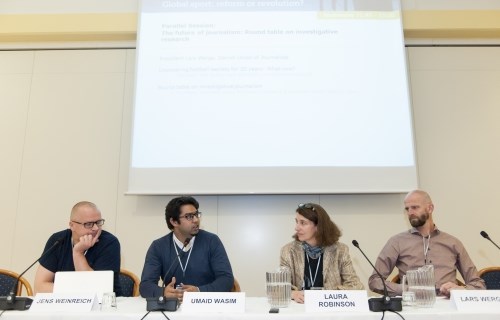What now for investigative sports journalism?

From left Jens Weinreich, Umaid Wasim, Laura Robinson and Lars Werge. Photo: Thomas Søndergaard
28.10.2015
By Marcus HoyA panel of international journalists agreed that the vast amount of information that is now available online makes research tasks far easier. Many more can engage in journalistic activities and see their work published, meaning more stories can be investigated from multiple angles and locations.
However, at the same time, most of today’s investigative journalists do not now have the backing of the big media houses. Freelancers without a powerful backer have little defence from legal threats, and are therefore more likely to be threatened. The risk of prosecution, violence or harassment could also be higher.
While the big media houses can offer protection to journalists, delegates heard, they are also increasingly betrothed to commercial interests. Canadian investigative journalist Laura Robinson said that she “didn’t even bother” going to the mainstream media with a story about Canada’s former Olympics' CEO, because all the nation’s media houses were sponsors of the 2010 Winter Olympics in Vancouver. “It was the new media, the Internet-based media that first took up the story,” she said.
German journalist Jens Weinreich said that information not deemed relevant to a specific investigation could be stored in a new information database shared between investigative journalists. Information deemed surplus to one journalist could be important for another, he said.
Local angle
Danish Journalists’ Union President Lars Werge agreed, saying that a broad international collaboration between investigative journalists could lead to less partial articles. Danish and other national media, he said, can delve very deep into international stories, but this rarely happens when no local angle exists. Cross-border collaboration would have the advantage of not focusing on the interests of one country alone, he said.
Werge also welcomed the large number of online media platforms that were now becoming available.
“The world needs journalists more than ever to curate the news,” he said. However, he added, the question how they could be paid remained unclear. Organisations including the New York Times were experimenting with so-called native advertising he said, where commercial messages are incorporated into a limited number of articles in order to fund other journalistic activities. He compared the shift from traditional to Internet-based media platforms to the “time when the car took over from the horse”.
Umaid Wasim of Pakistani newspaper Dawn, said that investigative journalism would not flourish in his country until news organisations offered sufficient backing of their journalists. While he had received strong support for a recent investigation into the destination of FIFA GOAL money, he said, other reporters receive little backing from their employers.
“Media organisations must make a stand or I don’t see a bright future for investigative journalism in Pakistan,” he said.





